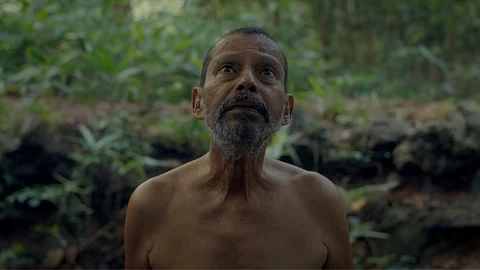
- HOMEGROWN WORLD
- #HGCREATORS
- #HGEXPLORE
- #HGVOICES
- #HGSHOP
- CAREERS
- ABOUT US
- CONTACT US

In the TV show Lucifer, hell is portrayed as a singular solitary experience. Each soul is trapped in its own psychological purgatory, locked in a room doomed to relive a single moment of guilt, over and over again. There are no guards or chains, just the unbearable weight of memory. While mythology depict heaven and hell as external realities, others argue they are internal constructs — fragments of the psyche governed by the things we choose to bury.
Sidharth Harikumar’s short film 'Vasu' lives in this psychological terrain. A 16-minute Malayalam drama set in rural Kerala, the film follows a retired police constable named Vasu, who years after his service, finds himself unraveling, unable to carry the burden of a past action committed in the line of duty. Vasu now lives in self-imposed exile, with each day as a reckoning. Haunted by what he once did, he reaches a point where confession becomes the only path forward.
The short film is set in a serene, idyllic village, but within, Vasu’s world is collapsing. The contrast is deliberate. The stillness of the surroundings only amplifies the disquiet of a man tormented by the past. The film sheds light on the emotional aftermath of morally conflicting duties, especially those carried out under hierarchical pressure.
Vasu was recently named a semi-finalist at the 2025 Student Academy Awards, a prestigious platform often dubbed the Student Oscars. It was one of only 15 narrative films selected globally, placing it among a rare group of emerging cinematic voices. “It was truly surreal,” Sidharth says. “You don’t expect an email from the Oscars in your inbox at midnight and when it did, it took a moment to process. Seeing my name on the official Oscars website was overwhelming. Coming from a modest background in South India, to be listed alongside filmmakers from some of the world’s most renowned institutions felt both humbling and affirming.”
But beyond the honour, the selection also affirmed Sidharth's belief in the resonance of stories. “This recognition has shifted something in me,” he tells us. “It’s not just about prestige, it’s a reminder that stories rooted in local realities can resonate globally. Being acknowledged by such a respected platform strengthens my resolve to keep creating work that is honest, culturally grounded, and emotionally universal.”
The idea for 'Vasu' was conceived during Sidharth’s time in Berlin, where he was studying cinematography. Surrounded by Holocaust memorials and museums, he found himself reflecting on state violence, and the moral crises of those who enabled it. “The city and its streets carried the echoes of the past through its silence and the remnants left behind,” he recalls.
He began researching similar accounts closer to home, in Kerala, determined to root this narrative in a place he intimately understood. Through testimonials of frontline workers, especially police officers, what he found was a generation of men conditioned to suppress their emotions, who “prioritized duty over conscience.”
Through 'Vasu', the filmmaker sheds light these on buried traumas. And in doing so, he presents a man not just at the mercy of his memories, but also of a culture that never gave him the tools to process them.
Sidharth's body of work often leans into psychological realism. “I believe human nature is deeply complex,” he explains. “We see these layers in the people around us every day… My work is simply a personal attempt to bring some of those emotions to the surface.” In Vasu, the filmmaker turns something as heavy as guilt into a poised meditation through the language of abstraction and ambiguity that he believes can be a tool for deeper interaction with the audience. "In many ways, that’s also why I believe cinema will continue to thrive," he insists. "It gives us endless ways to understand and reflect the human experience."
Follow Sidharth's work here.
If you enjoyed reading this here's more from Homegrown:
Short Film ‘Over A Cup Of Chai’ Unpacks The Complexity Of Mother-Daughter Relationships
In 'Moti' A Family's World Is Turned Upside Down When Their Dog Becomes A Real Boy
Stop-Motion Short 'Sulaimani' Explores The Joys & Tragedies Of The Migrant Experience
